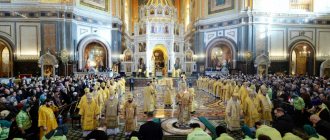Communion is one of the main Sacraments of Christianity. The Savior Himself left the Eucharist for His followers during the Last Supper. Jesus, and later the apostles, emphasized the great power of salvation in accepting God's gifts in the form of bread and wine, but this Sacrament must be approached in purity and freedom, having performed the Sacrament of Confession.
Communion without Confession is a Sacrament that, instead of blessing, can bring misfortune through the fault of the person receiving communion; touching a shrine without repentance is a sin of disobedience.
Why is Communion without Confession a sin?
Communion and confession are two independent Sacraments that are not related to each other. The first Christians celebrated the Eucharist daily, being in prayer. They were motivated by love for the Teacher, great morality, purity was the norm of that time.
A fairly short time passes, and Paul, in his First Epistle to the Corinthians, reports that the Lord revealed to the apostle the secret of communion with His body and blood, subject to the fulfillment of certain conditions. Reverence and fear should accompany Christians who decide to partake of the great Gift that bestows life or death.
Communion is a Sacrament established by the Savior during the Last Supper
Yes, it is illness or even death that is reaped by people who unworthily accept the Sacrifice of Christ. The Apostle Paul conveys Jesus' warnings (Cor. 11:23-25) that an unworthy approach to the Eucharist can cause illness and death.
The Apostle speaks of fear and reverence, that is, of reasoning about one’s sinfulness and uncleanness. It would seem that a person did a godly deed, went to church, took communion, but the illness does not go away, sometimes it gets worse, and the patient does not even realize that the reason lies in the unworthy acceptance of Jesus’ flesh and blood.
According to the Apostle Paul, unworthy acceptance of the Holy Gifts is a condemnation of oneself. Below we read how the apostle compares the Church to the body of Christ, and all Christians are her body. Christians who take part in Christ's meal must leave worldly amusements and sinful feasts, so as not to accidentally touch the cup of the demonic.
Interesting! Only the Holy Spirit moves the Church, instilling in the hearts of Christians love and faith, purity and freedom, which we acquire during Confession.
Each believer himself bears responsibility for unworthy acceptance of Communion, without repentance and Confession. Western churches have long abolished the rule of mandatory confession before the Eucharist, based on the fact that these are two separate sacraments.
Communion with the Body, in which there is no and never has been sin, is impossible for an earthly body burdened with sins. Unclean hands stretched out to the Sacrificial Gifts have no right to touch them without repentance; this is a great sin of disrespect for Christ.
Important! Confession before Communion is important, first of all, for the sinner himself, in order to begin the Sacrificial Gifts of Christ in spiritual purity.
Confession before Communion was introduced in Rus' many centuries ago; this law applies both on ordinary days and during major Christian holidays, including Easter. According to the Holy Fathers, confession can be attributed to the second Baptism, after which the soul finds healing and purification, and is capable of receiving the Grace-filled gifts of the Church.
Communion of the Holy Mysteries of Christ is necessary to enter eternal life
Having committed a sin, a person tormented by his conscience can go to confession without receiving communion, so as not to bear the sin on the next day, which may not come. It is permissible to confess, even if there are no plans to receive communion afterwards.
After Holy Communion
It is not customary to leave the church before kissing the altar cross in the hands of a priest. You should also listen to prayers of thanksgiving (or read them when you get home).
On the day of Holy Communion - behave reverently and decorously, in order to “honestly keep Christ accepted within you.”
From a canonical point of view, the practice of preparing for Communion is regulated by the following rules: the Council of Carthage 47 (58) and the Council of Trullo 29; St. Nikephoros the Confessor 9th; Timothy of Alexandria 5th and I Ecumenical Council 13th.
According to the rules of the Councils of Carthage and Trullo, one can receive communion only on an empty stomach (in practice, clergy make concessions for the sick); the 9th rule of St. Nikephoros the Confessor speaks of the possibility of giving communion to a dying person even after he has eaten food. The rule of Timothy of Alexandria defines the need for marital abstinence on the eve of communion (more details).
Source of the article: https://azbyka.ru/kak-gotovitsya-ko-svyatomu-prichashheniyu
How to prepare properly
Special attention is paid to preparation for communion. This period is important for every believer, as the basis on which the whole essence of the sacred ritual rests. Preparation for communion may depend on the age and other characteristics of the believer.
Prayer Rule
Home prayer occupies an important place in preparation for the ceremony. The day before, they read the “Succession,” which is called part of the sacred rite. At a divine service, it is customary to read 3 canons in succession:
- addressed to the Mother of God;
- repentant to Christ the Savior;
- repentant to the Guardian Angel.
Fast
The conduct of fasting depends on the believer:
- Those who regularly observe fasts are recommended to perform only liturgical short fasts.
- Those who begin to join the church and have not observed fasts are advised to undergo a three-day or seven-day fast. The duration of fasting depends on the recommendations of the priest, with whom these nuances are discussed on the eve of planning communion.
Confession
Confession and absolution are discussed with the priest in advance. The time for confession is chosen so that it is enough for a detailed action of self-awareness. Sometimes the priest may ask for confession again and postpone the sacrament until the next time.
How to get to the Orthodox Church
Many patriarchs and clergy believe that most services are a kind of preparation for participation in communion. This is the most important act in the system of hierarchy of worship, which is the apogee that unites man with God. Gennady Scholarius believed that the rite of the Eucharist should be higher than the sacrament of baptism or confession.
For Orthodox believers, the ceremony takes place taking into account long, step-by-step preparation. According to the clergy, it represents a complete transformation of the body and a shock to the soul. To be ready for communion, you must follow the basic rules:
- conscious attitude towards communion;
- sincere faith in the Lord;
- understanding the meaning of communion;
- possession of basic theoretical knowledge;
- achieving complete peace (forgiveness and reconciliation with others);
- knowledge of thanksgiving prayers and texts (“Following to Holy Communion”).
These rules relate to the internal state of the believer, but there are specific techniques without which the sacrament is impossible:
- Eucharistic or liturgical fast. This is a pre-rite fast, which consists of not eating on the eve of communion, starting at midnight the previous day. The fast lasts taking into account the preparation of the believer, but cannot be less than 6 hours.
- Confession. This is one of the sacraments, which is called the sacrament of repentance. It is held in the evening, on the eve of communion, or in the morning, before the start of the liturgy.
Adults who are confessing for the first time are recommended to undergo repentance, excluding Sundays or holidays. Children under a certain age are not allowed to confess.
Rules of behavior in the temple
There are several traditional rules about how to behave in a worship service. They are necessary for those who are just joining church life, or for those who want to teach children:
- Beginners who have embarked on the path of churching are allowed to use the prayer book.
- To go to the temple, they choose special clothes: they do not wear trousers, short skirts, or expose parts of the body. Women must have a headscarf or scarf; men must remove their hats.
- When entering, they must bow, having crossed themselves first.
- When leaving the temple, bows are repeated.
- To perform prayers, it is advised to close your eyes, focus on your inner world, not look around, and think about your affairs.
- The time spent at the liturgy, according to church canons, means making a sacrifice to God, therefore the entire service is stood from the very beginning to the end. Only elderly or sick people are allowed to sit.
Prayer is work
Prayer teaches repentance. If a person has no experience of real spiritual life, no experience of prayer and personal standing before God, then he will not have real, deep and sincere repentance. Prayer, especially repentant prayer, seems to pave the way for the soul to God. One of the most important prayers, at least for monastics, is the Jesus Prayer—of the spirit of repentance. Standing before God itself practically cannot be other than repentance, at the level of spiritual development at which most of us find ourselves.
- On the other hand, prayer is a gift from above...
— Prayer is work. “The Kingdom of God is in need of force, and the needy women delight it”
(Matthew 11:12). This means that the Kingdom of Heaven will be received by those who made efforts to obtain it. This is why we must force ourselves, even if prayer is difficult at first. Of course, the Lord, in His mercy, gives grace and prayer to the one who prays, but for this the person himself must work on his soul.
This is the only way a person learns to repent.
If he lives an absent-minded life, without prayer, then maybe one day - if “thunder strikes” - he will be able to come to a feeling of repentance and prayer, but this will not be the gift you are talking about.
Standing in the photo (from left to right): hieromon. Theophan (abbot and confessor of the Gornenskaya monastery in Jerusalem), hieromon. Photius (abbot and head of the Priozersk Valaam metochion), hierodeacon. Vissarion (schema-abbot Varachiel, Konevsky Monastery), abbot Andronik (Trubachev, first Valaam abbot (1990-1993), teacher of MDAiS), abbot Kosma (TSL), hieromon. Gerontius (TSL), hieromon. Barsanuphius, a great sinner and even a bad one, is a hierodesiac. Parthenius (my fellow novitiate in Danilov, then an Optina resident, and now abbot of the Anastasov Monastery in the Tula diocese). Three children are sitting. Cosmas - I don’t remember their names.
Viceroy Fr. Andronik and Fr. Nazariy.
The gate church of the supreme apostles Peter and Paul and the passage to the monastery. 1990. On the right you can see the “red store”, a former icon and bookstore, and until recently a hotspot that supplied cheap drink, cigarettes and some products to local residents and not only (when dean had to catch monasteries there as well).
View of the Transfiguration Cathedral and schematic cells in the outer square from the north side. The white building in the square is the hospital Church of the Life-Giving Trinity, half bombed by Soviet aviation.
At Kelarna.
1995 Reader at the Skete of All Saints (now Hieromonk Gregory).
Hegumen Feofan (Krasnov), confessor of the Gornenskaya monastery in Jerusalem.
Hieroschemamonk Cleopas (Antonov) is buried in the cemetery at the Skete of All Saints, near the eastern wall of the altar. Photo circa 1994.
Previous Next
Pioneers. “If only the monk would humble himself...”
Duration of the ritual in the temple
The clergy inform in advance what period of time is most suitable for Holy Communion. Usually it is performed at a ritual service, liturgy, in the first half of the day. Liturgies last from 7 to 11 o'clock, their duration directly depends on the number of people who want to receive communion, as well as on the nature of the service, that is, its dedication.
Those receiving communion must endure the liturgy from the very beginning, and must also attend the evening service on the eve of communion. This stage is considered preparation for the ceremony. Liturgies are held in monasteries and large churches every day.
Reference! For parish churches, the frequency of the liturgy is determined by the priest.
Getting rid of damage through 3 and 7 churches
With the help of church rituals, you can heal your soul from negative slander of any complexity. But the stronger the witchcraft, the more complex the ritual that gets rid of it. To get rid of weak or mediocre damage, the ritual of passing through 3 churches will help, which is carried out as follows:
- You need to attend different churches for 3 Sundays in a row. An important condition is that none of these Sundays should fall on any Christian holiday;
- In all these churches, one should offer a prayer to the Guardian Angel, begging him for help and protection, and then light candles for the health of all people one knows;
- Before leaving the temple, you must read any of the prayers that relieve damage;
- Upon returning home, 3 church candles are lit. You cannot tell anyone about the ceremony.
In turn, the rite of purification through 7 churches will save you from strong and destructive witchcraft. It is carried out this way:
- A day before the start of the ceremony, light a candle near the face of the saint who patronizes you;
- At dawn the next day, set out on an impromptu pilgrimage to seven churches. The tour of the temples must be completed before sunset;
- Order a magpie in each of the churches you visit, light a candle for the health of the victim of damage and his family members (if you want to remove the family curse);
- Collect holy water from all churches you visit. Drink this life-giving moisture and wash your face with it over the next week;
- At the end of the ritual, return home. Without telling anyone about your pilgrimage, pray to the Guardian Angel.
Remember that it is impossible to recover from damage in an instant. Negative slander is tantamount to illness, only it is mental illness. Just as the condition of a recovering patient gradually improves, you will feel better over time. But under no circumstances should you rush things and get angry at the lack of immediate results when removing damage from a church. You risk incurring the wrath of the Lord, and this is much worse than any, even the most powerful, witchcraft slander.
Share with your friends!
Subscribe to our Yandex.Zen channel or Yandex.Messenger










